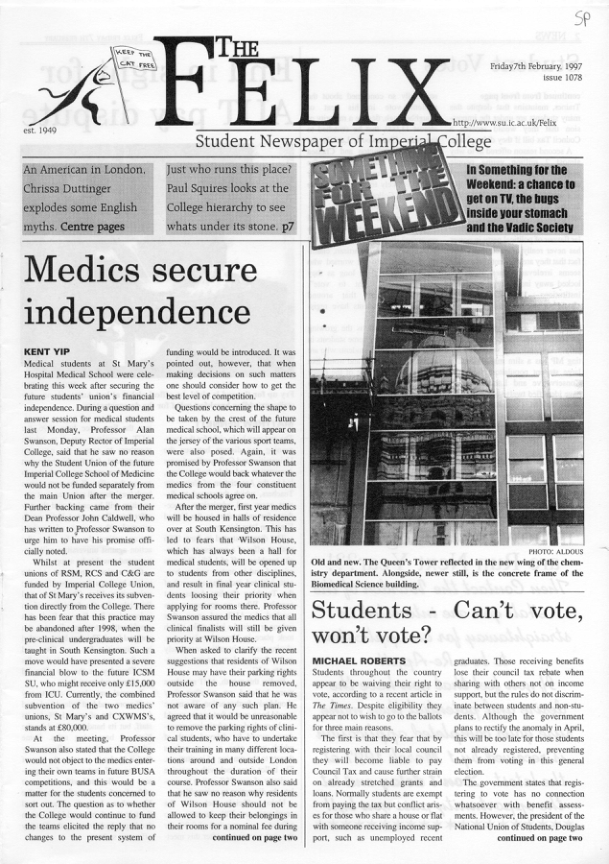Bugs-U-Like?
Is there any food you would consider 100% safe to eat? No sooner has one food scare passed before another is affecting our supermarket choices. The battering of public confidence by salmonella in eggs, the crisis over BSE in beef and deaths in Scotland due to Escherichia coli has finally persuaded the Government of the need for an independent voice on matters of food and health.
Last week Douglas Hogg (the ‘minister for the beef crisis’) announced that a Food Safety Council would be set up after the General Election. The council of 20 or so experts will be headed by an independent scientist. The new chief food safety officer would have a role similar to the chief medical officer, and be expected to speak out on all matters concerning public health and food.
The BSE saga first highlighted the difficulty MAFF (the Ministry of Agriculture, Fisheries and Food) had in separating the interests of the public from those of the food producers. The perception was that MAFF was too closely involved with the farmers problems to put public health first. However the new food safety council may not reassure the public as much as the Government hopes. Farmers in general welcomed the announcement last week, whereas consumer groups and the opposition parties were disappointed that the Governments’ proposal did not go far enough. Labour wanted a food safety agency, rather than an advisory council, to be set up with more power and resources to protect consumers.
The new council will provide advice on all aspects of food safety, from genetically modified tomatoes to the use of antibiotics as animal growth promoters as well as quality and labelling. But the main problem the council will have to tackle is the alarming increase in food poisoning. This month, fears over salmonella in baby’s milk are just another example where bacteria have threatened public health.
Remember December last year? In Lanarkshire, eighty year old Harry Shaw tucked into a steak pie for lunch, supplied by John Barr, the local butcher. Nine days after the luncheon, Harry Shaw died in hospital and shortly afterwards, four more of the party followed suit. Harry and his friends were all killed by the E. coli 0157 bacterium, traced to gravy in the steak pies served at the church lunch. By the end of the year, the death toll was eighteen and more than 400 people in Lanarkshire have reported symptoms of E. coli poisoning. The scientist heading the offical inquiry into the outbreak, Hugh Pennington, has already called for legislation to introduce a new licence for shops selling meat and for urgent action to keep raw and cooked meat separate
How can it be that in a world where we can transplant animal organs into humans, where we can send rockets to the moon and where we can produce babies in a test tube, we cannot defeat what Professor Hugh Pennington, a bacteriologist at the University of Aberdeen, calls "stupid bacteria"? Theoretically, food poisoning is one of the largest preventable public health problems. People become ill from food poisoning when harmful micro-organisms, such as the E. coli bacterium and Botulism toxins, multiply until present in huge quantities. In such large quantities they cause symptoms such as diarrhoea, vomiting and low blood pressure. Most of us have had food poisoning and remember only too well the runny tummy and sickness it entails. However in some, particularly the very young, the very old and pregnant women, symptoms cause kidney failure and in some circumstances death. In the words of Lucretius"What is food to one man is bitter poison to others".
According to Hugh Pennington bacteria are winning the war because "some bacteria divide every 20 minutes meaning that they can evolve easily and rapidly," he adds that, "our failure to keep ahead comes from the human failings of hubris and complacency".
By 1994, the number of reported cases of food poisoning had increased five times since 1984. This may be an underestimation; imagine how many times you feel ill, suspecting a dodgy curry. You take two or three days off, but you never report it. These unreported cases could potentially amount to several hundreds or thousands each year.
But what does this sickness cost the country? The figures, if reliable, are staggering. The London School of Hygiene and Tropical Medicine estimate that a single outbreak of Salmonella in 1993 cost the Government between Ł224 and Ł321 million in lost man hours and provision of adequate health care. So bearing this in mind, what controls were in place?
The Government introduced the Food Safety Act in 1990 which gave power to local councils to better regulate the hygiene standards in food industries within their jurisdiction. It also placed the onus of hygiene and food safety on the manufacturers, with failure to meet the required levels resulting in prosecution. However, Prof. Pennington’s final report into the Lanarkshire outbreak, expected in two months, is likely to demand wholesale reform of the current legislation.
Brain Mosely, head of the Government Institute of Food Research Laboratory, said recently that "food poisoning is out of control" and the country is still reeling from the shock of BSE-contaminated meat. Therefore, it is clear that something drastic needs to be done, when all previous legislation and governing bodies responsible for food safety failed to prevent the outbreak in Lanarkshire. However, it seems doubtful that this one Government safety officer will be the magic ingredient we need for good, safe food.





